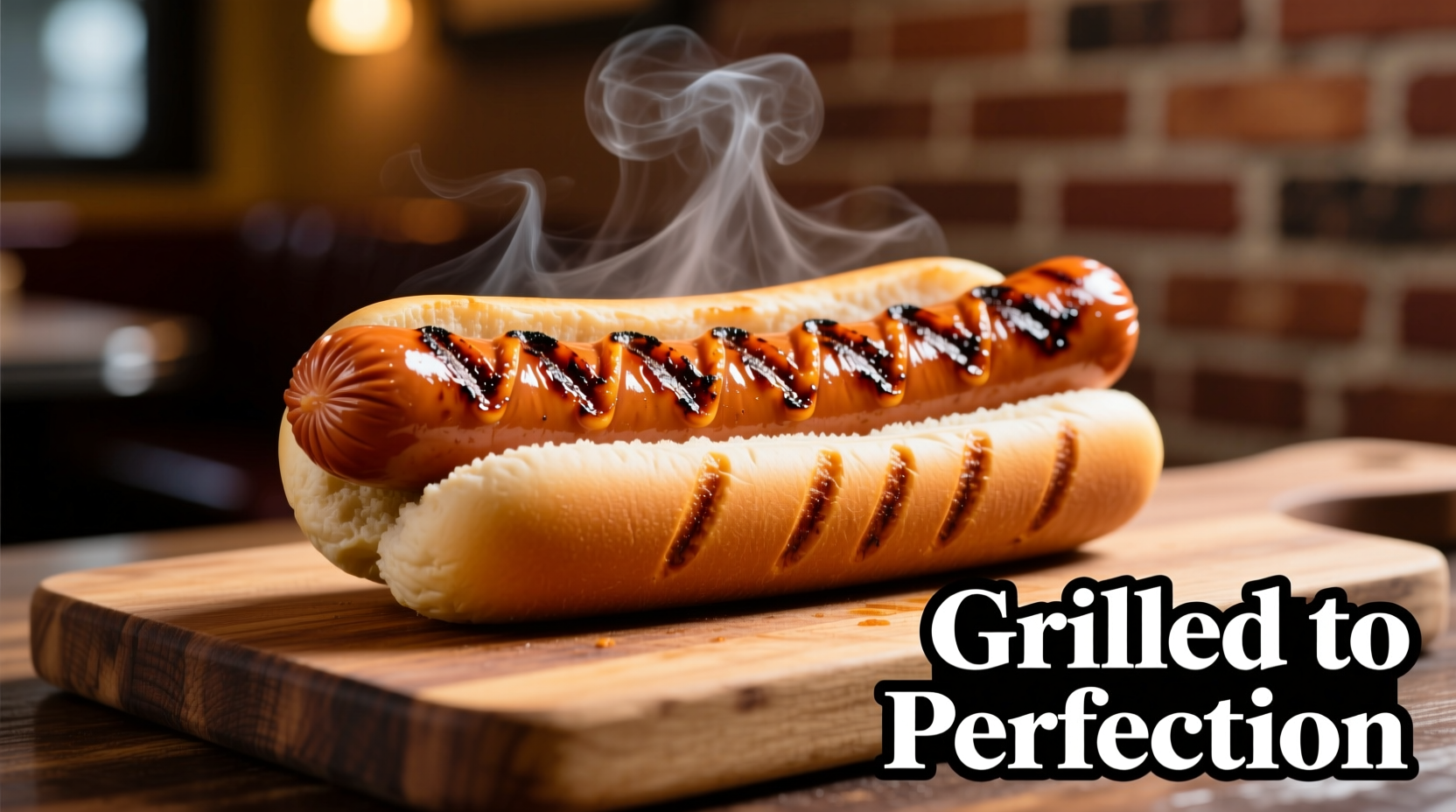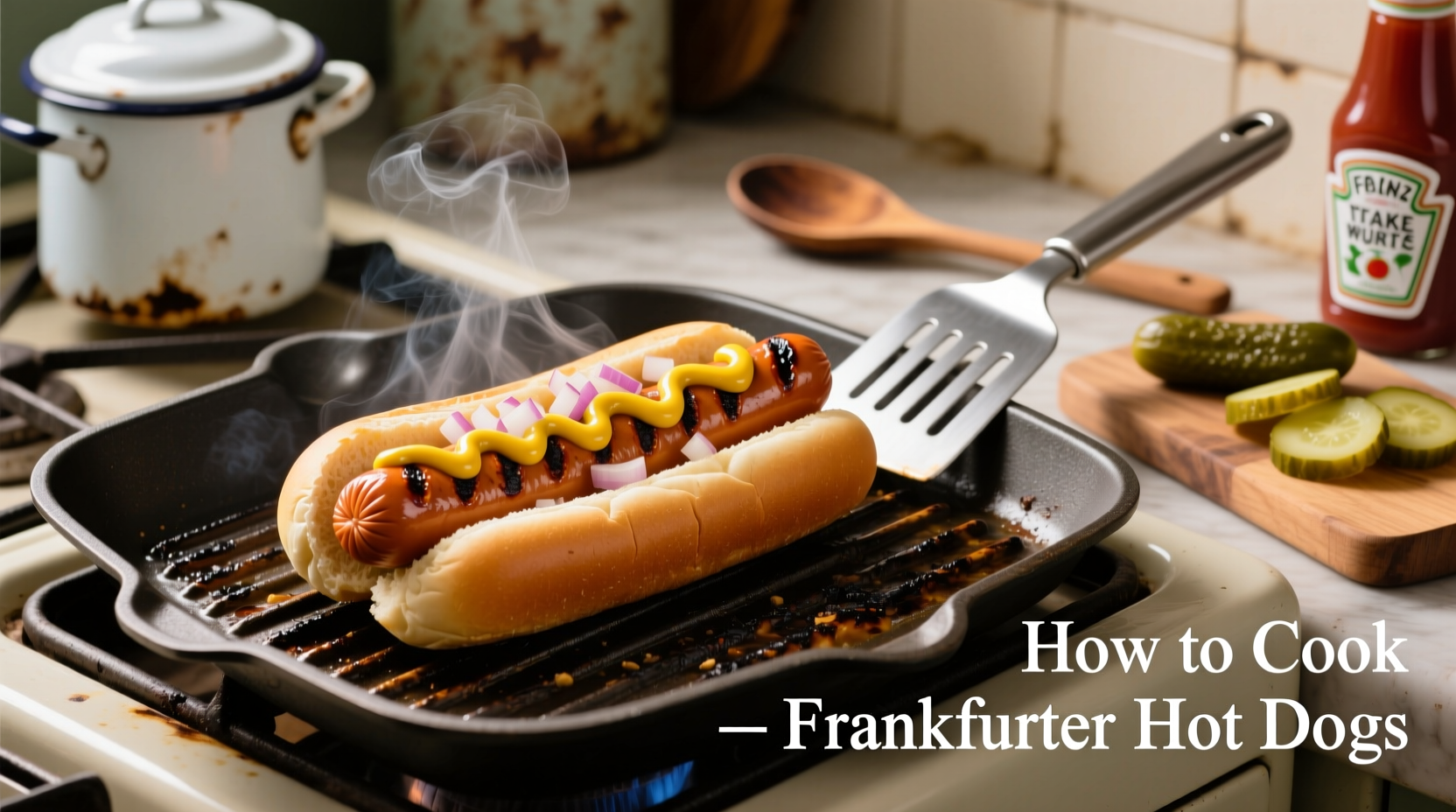Discover exactly how to cook frankfurter hot dogs to perfection with this comprehensive guide. Whether you're preparing them for a backyard barbecue, weeknight dinner, or game day snack, you'll learn five reliable cooking methods, professional chef techniques, food safety essentials, and creative serving ideas that transform basic hot dogs into restaurant-quality meals.
Essential Equipment for Cooking Frankfurters
Before you start cooking, gather these basic kitchen tools:
- Medium saucepan with lid (for boiling or steaming)
- Grill or grill pan (for outdoor or indoor grilling)
- Non-stick skillet (for pan-frying)
- Meat thermometer (critical for food safety)
- Toast tongs or grill spatula
- Hot dog buns and your favorite toppings
| Cooking Method | Prep Time | Cook Time | Best For |
|---|---|---|---|
| Simmering | 2 min | 5-7 min | Rainy days, indoor cooking |
| Grilling | 5 min | 7-10 min | Summer barbecues, smoky flavor |
| Pan-Frying | 2 min | 6-8 min | Quick weeknight meals |
| Steaming | 3 min | 8-10 min | Preserving moisture, restaurant-style |
| Broiling | 2 min | 4-6 min | Indoor alternative to grilling |
Five Proven Methods to Cook Frankfurter Hot Dogs
Simmering Method: The Classic Approach
Simmering remains the most reliable method for cooking frankfurter hot dogs evenly without splitting. Fill a medium saucepan with enough water to cover the hot dogs but not submerge them completely. Bring to a gentle simmer (not a rolling boil) over medium heat. Add hot dogs and cook for 5-7 minutes until they reach 165°F internally. Remove with tongs and drain briefly on paper towels before serving.
Professional tip: Add a splash of beer or a teaspoon of vinegar to the simmering water for enhanced flavor without compromising food safety. Never pierce hot dogs before cooking, as this allows juices to escape and causes splitting.
Grilling Method: Achieving Perfect Char
Preheat your grill to medium heat (about 350°F). Place hot dogs diagonally across the grates to create attractive crosshatch marks. Cook for 7-10 minutes, turning frequently with tongs until evenly browned with slight charring but no splits. The USDA Food Safety and Inspection Service recommends cooking processed meats like frankfurters to an internal temperature of 165°F to eliminate potential listeria contamination, which is particularly important for at-risk populations. USDA guidelines confirm this temperature ensures safety while maintaining optimal texture.

Pan-Frying Technique: Restaurant-Quality Results Indoors
Heat a non-stick skillet over medium heat with one tablespoon of water. Add hot dogs and cook for 6-8 minutes, turning frequently until evenly browned. The water creates steam that helps cook the hot dogs through while the direct contact with the pan creates delicious browning. This method gives you precise control over the cooking process and prevents the common problem of split casings.
Steaming Method: Preserving Maximum Juiciness
For the juiciest results, try steaming. Place a steamer basket in a pot with one inch of water, bring to a boil, then add hot dogs. Cover and steam for 8-10 minutes. This gentle cooking method maintains the hot dog's natural moisture while ensuring thorough heating. Culinary professionals at the Culinary Institute of America recommend this technique for commercial settings as it produces consistently tender results without the risk of drying out.
Broiling Alternative: Indoor Grilling Without Special Equipment
Position your oven rack 4-6 inches from the broiler element and preheat. Place hot dogs on a broiler pan and cook for 4-6 minutes, turning once, until browned in spots. Watch carefully to prevent burning. This method works well when outdoor grilling isn't possible but still delivers that desirable charred flavor.
Avoiding Common Frankfurter Cooking Mistakes
Many home cooks make these critical errors when preparing hot dogs:
- Boiling instead of simmering - Rolling boils cause casings to split
- Overcooking - Leads to tough, rubbery texture and juice loss
- Skipping the thermometer - Visual cues alone can't confirm safety
- Piercing before cooking - Releases natural juices and causes splitting
- Using high heat - Creates burnt exterior with cold interior
According to a 2023 survey by the National Hot Dog and Sausage Council, 68% of consumers reported splitting as their top cooking frustration. The solution? Always start with room-temperature hot dogs (remove from refrigerator 15 minutes before cooking) and use medium heat with frequent turning.
Serving Suggestions That Elevate Your Frankfurters
Take your cooked frankfurters to the next level with these professional presentation tips:
- Lightly toast buns on the grill for 30 seconds before serving
- Spread a thin layer of mustard inside the bun before adding the hot dog
- Create diagonal cuts in the hot dog for better topping adherence
- Serve with a side of crispy potato chips or classic coleslaw
- Offer a variety of mustards (Dijon, whole grain, spicy brown)
For authentic German-style presentation, serve frankfurters with sauerkraut, potato salad, and a side of sweet German mustard. In Chicago style, add neon green relish, onions, tomatoes, pickle spear, sport peppers, and celery salt on a poppy seed bun.
Food Safety Essentials for Frankfurter Preparation
Frankfurters are fully cooked during manufacturing, but the USDA recommends reheating them to 165°F because they can become contaminated with Listeria monocytogenes after processing but before packaging. This bacteria can grow even under refrigeration, making proper reheating essential for vulnerable populations including pregnant women, older adults, and those with weakened immune systems. The Centers for Disease Control and Prevention reports that proper reheating reduces foodborne illness risk by 95% for processed meats. CDC guidelines emphasize this precaution for at-risk groups.
Always follow these food safety protocols:
- Store unopened packages in the refrigerator below 40°F
- Use within 7 days after opening
- Never leave cooked hot dogs at room temperature for more than 2 hours
- Refrigerate leftovers within 2 hours of cooking
- When in doubt, throw it out - don't risk foodborne illness
Troubleshooting Your Frankfurter Results
Encountering issues with your cooked hot dogs? Here's how to fix common problems:
Problem: Split Casings
Solution: Reduce cooking temperature and avoid piercing. Make shallow diagonal cuts before cooking if you prefer a split appearance. Starting with room-temperature hot dogs prevents thermal shock that causes splitting.
Problem: Rubbery Texture
Solution: Don't overcook - use a thermometer to verify 165°F internal temperature. Simmering or steaming produces more tender results than high-heat methods.
Problem: Bland Flavor
Solution: Add flavor to the cooking liquid with beer, wine, or spices. Try wrapping hot dogs in bacon before grilling for extra richness and flavor infusion.
Perfect Pairings for Your Cooked Frankfurters
Complete your meal with these complementary sides that balance flavors and textures:
- Creamy potato salad with fresh herbs
- Crisp coleslaw with apple cider vinegar dressing
- Grilled corn on the cob with chili-lime butter
- Classic potato chips or homemade french fries
- Cold craft beer or sparkling lemonade
For a complete meal experience, consider the flavor profile you're creating. Smoky grilled hot dogs pair beautifully with tangy slaw, while boiled frankfurters work well with classic American sides like baked beans and chips.











 浙公网安备
33010002000092号
浙公网安备
33010002000092号 浙B2-20120091-4
浙B2-20120091-4